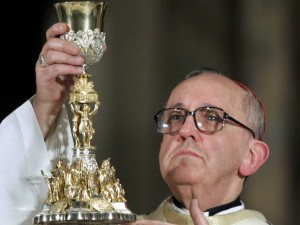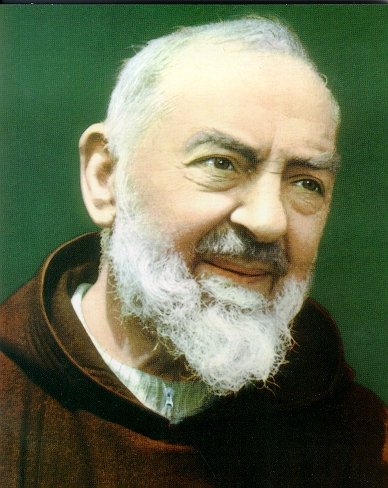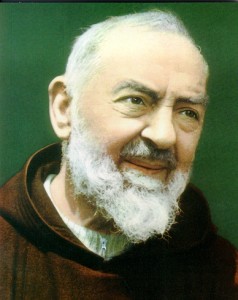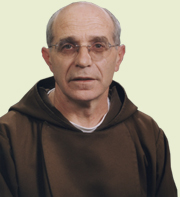On August 31 in 2009, I followed a Capuchin friar from the chapel at Most Holy Redeemer Catholic Church in Tampa to his desk in his office next door. Fr. John Aurilia, then Most Holy Redeemer’s pastor, agreed to let me interview him for a story.
I dove right in with questions: What vows does a friar take? Why did you become a priest? What exactly do you own (not much!), and do you really live in poverty? Fr. John answered with humility and an Italian accent. He shared his story, eventually divulging what I never expected he would:
“In 1967, I was called to be Padre Pio’s secretary,” he said.
“I’m sorry,” I said, certain I had misheard him. “Whose secretary? I thought you said Padre Pio…”
As it turns out, he did.
Fr. John was ordained a priest in Campobasso, Italy by Bishop Alberto Carinci on Dec. 17, 1966. In 1967, for the month of August, he served as St. Padre Pio’s temporary secretary. Padre Pio was a friar known for receiving the stigmata (wounds like Christ’s); for bilocation (yes, being in two places at once); and for miraculously knowing stuff that nobody told him. Padre Pio died in 1968 and was canonized a saint by the Catholic Church in 2002. Now, Fr. John is pastor of Our Lady of Mt. Carmel Church in Passaic, N.J. He and I have kept in touch since I interviewed him for the paper, and he was gracious to chat with me about Padre Pio:
AS: Did you know, or had you met Padre Pio before you served as his secretary?
Fr. John: Yes, when we were in the Minor Seminary in Pietrelcina, about 40 miles from San Giovanni Rotondo, we used to visit Padre Pio very frequently to get his blessings. For about 10 years before I became his personal secretary, there was a constant contact with Padre Pio. Then, I was requested to substitute (for) his personal secretary for a month.
AS: What did you know about Padre Pio before you worked with him?
Fr. John: That he was a saintly Friar, that he performed miracles, he had the stigmata, and the gift of knowing hearts and minds, and the gift of bilocation.
AS: Where did you and Padre Pio work and live?
Fr. John: The office where I worked was on the third floor of the friary. I was sleeping on the second floor, where the others friars were sleeping (including Padre Pio). There were at that time about 15 friars living in the friary. The dining room was on the first floor. The friary was attached to the church, so that the friars could go to the church without going outside. In front of the church and the friary there is a big plaza to accommodate the crowds, and access public transportation to the city. The Hospital Casa Sollievo della Sofferenza is located about 500 feet from the church. The friary has a secluded garden in the back, with huge trees, vegetable garden, flowers, big enough to take a good walk through the many walkways. At my time, the whole place was always very busy as it is now…even more! The town of St. Giovanni Rotondo originally was not connected with our friary and church, as it is now. When Padre Pio was a young priest stationed in San Giovanni Rotondo (in the 1920s-40s) the friary was not accessible by public transportation. It was only accessible by walking or riding a mule or donkey. It was located on top of the hill.
AS: What did you discover about Padre Pio by being his personal secretary?
Fr. John: I did not discover anything new from what I knew before, except that his best gift was the gift of humility, because, although people were coming to him by the thousands, he was always humble, and never changed his daily schedule: many hours of prayer, many hours of confessions, and a long mass (more than an hour).
AS: When I think of St. Padre Pio, I think of the stigmata, and of a prayer of his that I frequently pray. What do you think of when you think of Padre Pio?
Fr. John: I think of a regular human being, who happened to be very saintly, by the grace of God. He always kept his smile, in spite the many sufferings. I also think of Padre Pio as a humble, pleasant, and prayerful person.
AS: My favorite St. Padre Pio quote is the popular and powerful “Pray, hope, and don’t worry.” While you worked with him, what – if anything – did Padre Pio say to you personally that enriched your life like “Pray, hope, and don’t worry” enriches mine?
Fr. John: He spoke to me without words. He spoke to me very eloquently and powerfully with his way of life (constant prayer and suffering). I do remember that he told me something really insightful about prayer: “John, prayer is the key which opens the doors of heaven.”
AS: Did you witness firsthand the stigmata, bilocation, or other miracles?
Fr. John: Yes, I saw the stigmata many times, when he did not have on the half-gloves. I never experienced bilocation and other miracles, but I do know they are true because the people who were affected by (it) told me first hand. I once experienced something unusual. I did not know how to answer to a lady who was asking (in a letter to Padre Pio) if (her) son (should) be a doctor or a priest. So, I went to Padre Pio (to ask) how to answer. Padre Pio never saw the letter, which I had in my hands, and before I started asking, he promptly said: “Tell her the son is going to be a good doctor.” I was shocked!
AS: In what way is your spirituality or priesthood influenced by St. Pio?
Fr. John: After living with him, I understood that my priesthood is not mine, it belongs to Jesus. I am only an unworthy instrument. I also believe that prayer and humility are the greatest strengths I find in my religious life.
AS: Do you frequently ask St. Pio to intercede for intentions in prayer?
Fr. John: Yes. I ask him every day, sometimes more than once a day.
AS: Why would you recommend we ask St. Pio to intercede for us?
Fr. John: Because I know him, I spoke to him, I touched him, I love him.
AS: How did St. Pio’s death and canonization impact you?
Fr. John: The death and canonization impacted me in a way that my life was never the same ever since: a new look at religious life, more positive about goals to achieve and virtues to pursue.
AS: What, ultimately, did you learn about God and/or life by working with Padre Pio?
Fr. John: I learned that God is not a judge, but a loving Father and Mother, and life is worth living, only if there is plenty of hope, faith, and love.
– – – –
Click here to read the story I wrote about Fr. John for the Times.
Click here to visit Fr. John’s church website.







